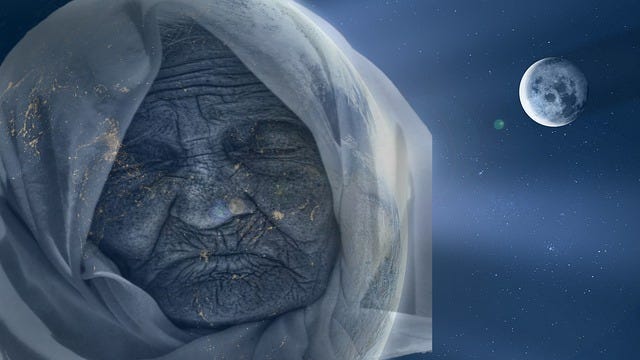Creating the Webbd Wheel: Motherhood
In which having a mother connects us all ...
I’ve said it before: stories survive because they speak to some kind of deep, shared human experience of all people in all places across all times.
Everyone has had a mother. Remember, stories are often metaphors. We have to let go of our literalism and concrete thinking. Maybe your mother was a grandmother, an institution, an aunt, an older sibling, or a wolf. Maybe your father was your primary caregiver and nurturer. Maybe your mother was absent and maybe she was present. Maybe she left you. Maybe she was a great mother, a good-enough mother, or a destructive mother. It doesn’t matter.
Every single one of us has had an experience, even if it was a lack, of mothering, and that initial nurture (or lack) shapes us in powerful ways for the rest of our lives.
Not everyone is a mother, of course. I am. Being a mother is just as powerful as having one, and that role also shapes us irrevocably, for good or for ill. Speaking as a daughter and a mother, no other relationships in my life have been as powerful as these.
Naturally, that power comes with passionate feelings: anguish and love, rage and joy, and grief beyond bearing. My blog, Harvesting Stones, focuses on emotional intelligence. If you want to know more about feelings and how to manage them, you can go there.
The Webbd Wheel series reflects many of the ideas in Harvesting Stones, but examines them through the lens of imagination rather than reason. As I write the blog, I write the books. The creative writing came first, but the blog has been of inestimable value in helping me focus and think through concepts.
Many of our old traditional and oral stories deal with every imaginable aspect of motherhood, fatherhood, childhood, and other family ties and relationships. This is true in all cultures. The idea of the Holy Mother is also present in many of the world’s religious frameworks. It shapes our relationships to our planet, Mother Earth, acknowledging that without a healthy place to live, we will all die.
In this third post of The Hanged Man, two mothers grieve together. They have much in common, though one is out of Greek mythology and the other from a German fairy tale. Their daughters also have much in common, as we shall see.
Old stories are often quite short, and since I was a child, I’ve had questions about what happened after the story ended. I never believed in happily ever after. It didn’t ring true. Now I’m finally answering some of those old questions, having lived long enough to have seen and done much and been blessed by the presence of many women in my life, all daughters and many mothers.
Motherhood is idealized just like romance. If our experience is not a blooming pregnancy, abundant breastfeeding, sweet dimpled babies, and large-eyed beautiful children, we think we’re doing something wrong. We’re broken. We’re ugly. We’re unlovable, unloving, and bad mothers.
I spend a lot of hours right now searching sites providing free images to creators, like Pixabay and Unsplash. I notice, when searching for “mother” pictures, all the women are beautiful. The sun is shining. Everyone around her is attractive and joyous. There are flowers and lovely clothing and ripe bellies. Little feet, little shoes, little hands. Loving couples. Smiling, happy, clean babies and children. Aged mothers surrounded by their offspring, gracious, dignified, and fulfilled.
I hope at some times, for some people, these pictures represent real life. For many, I know they do not. Motherhood, like romance, like everything, has a dark side, a side we don’t talk about or make images of, and that’s the kind of experience I’m drawn to. There’s more to life and relationships than these pretty images, and I’ve always been more interested in real than pretty.
The mothers and daughters and sons in The Webbed Wheel series, some familiar and some new to you, are real. (That makes me smile. They’re fictional, but they’re written realistically!) They’re imperfect and their relationships are imperfect. They’re not always happy, they don’t always feel loving, and they don’t always like each other. They make mistakes. They fight. They separate and reconcile. They abandon and reject one another. They hurt and betray one another. They teach one another.
This, too, is motherhood, and indeed all relationships, and I honor it. I believe we need reality in our lives and our stories, because stone is hard. Water is wet. People can be both destroyers and creators. Connection always involves disconnection, in the same way life always involves death.
The two mothers you will meet in today’s post are only the first two of many in this series. The theme of motherhood in various aspects runs strongly through my writing, and rightfully so. It’s a central human concern, one linking us together.
We are not so different from one another, after all.
(This essay was published with Post #3 of The Hanged Man.)



